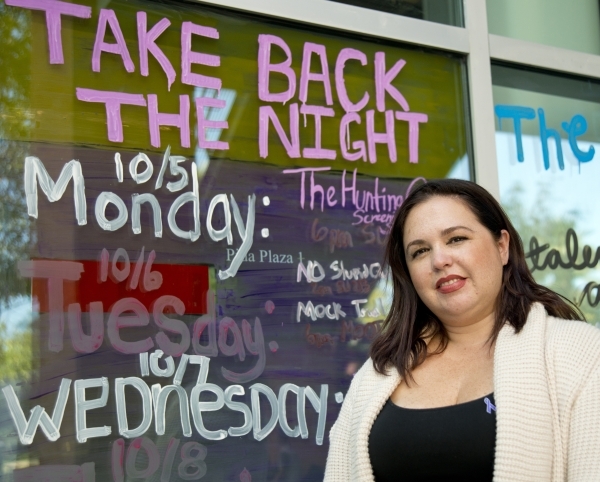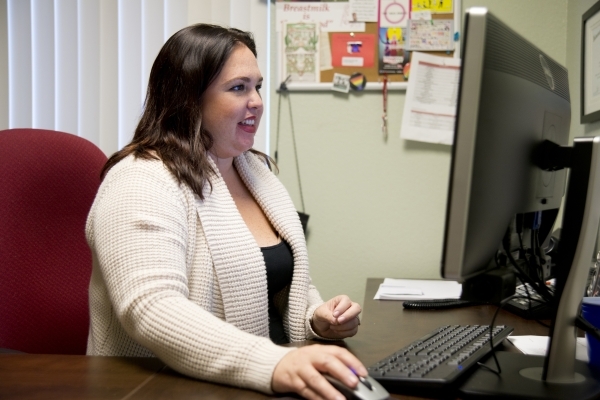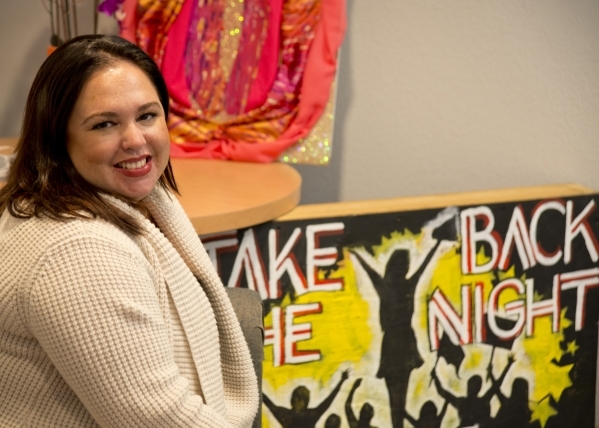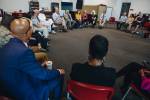UNLV women’s center director discusses Take Back the Night
Vegas Voices is a weekly question-and-answer series featuring notable Las Vegans.
As a student at UNLV, Christina Hernandez found her calling while working with children suffering from post-traumatic stress disorder due to sexual abuse.
After graduating with a bachelor's degree in psychology in 2005 and receiving a graduate certificate in women's studies, she worked at the Rape Crisis Center, focusing on educational outreach. For the past three years, Hernandez has served as director of UNLV's Jean Nidetch Women's Center.
Hernandez, born and raised in Las Vegas, recently discussed the community and the Take Back the Night event, which raises awareness of sexual violence and resources available to survivors.
Review-Journal: What is your favorite thing about Las Vegas?
Hernandez: I think it's the community. A lot of the time, people think there is none here. But at UNLV in particular, there is a large feminist community. You combine my love for feminism with education and Las Vegas in general, it makes for a good community here.
Review-Journal: What is something you wish was different about Las Vegas?
Hernandez: I now have two children, so I wish (there were) more activities for young children.
Review-Journal: How do your job and Las Vegas' culture clash?
Hernandez: Unfortunately, Las Vegas comes with the tagline, "What Happens in Vegas Stays in Vegas." The negative part of that is the way we are talking about sexual assault. So you have students who may come to Las Vegas or to UNLV with this preconceived notion about Vegas.
Review-Journal: How has Take Back the Night changed over the years?
Hernandez: It's changed a lot. It used to be just a resource fair where we set out some tables and do one day of programming. It wasn't always a huge showing of the campus and it seemed to be community partners who showed up to support it.
Over the years, it transformed into a student-led program and has expanded to six days. People have really taken ownership of it.
Other partnerships have been formed over the years. It's not just the responsibility of the women's center anymore. It's a collaborative effort from the entire community. In a sense, UNLV has stepped up to take ownership in making a safer campus.
Review-Journal: What can people expect from this year's event?
Hernandez: We are having events at different times so we can reach different students.
On Wednesday, we are having "Survivors Speak Out." Students will be sharing their experiences. We will discuss everything from how to intervene if you saw something or how to help a fellow student.
Thursday is a full day: great speakers, a concert and a resource fair in which we've invited community partners off and on campus to show what services are available.
Friday, UNLV goes purple. We are trying to engage the campus to stand up against sexual violence.
We end Saturday with a training to teach hands-on skills about how to intervene if you do see something happening.
Review-Journal: Are there still misconceptions about what sexual assault is, in particular among college students?
Hernandez: I think issues of consent and alcohol is one of the biggest ones. People don't recognize when you talk about sex assault, when you're under the influence, you're not able to give consent.
Also, when we talk LGBTQ community, there are a lot of misconceptions — more so domestic or dating violence.
There is still a misconception that men can't be raped by women.
Review-Journal: From the president talking about it to more awareness in media by covering survivors' stories, how has the conversation changed (if it has at all)?
Hernandez: I think it has changed. I think the reason why is because there has been so much talk of it in media and survivors are being able to speak out. Their stories help hold institutions accountable, which is a huge turning point.
Review-Journal: Do events like Take Back the Night help fuel the conversation?
Hernandez: I think gives an opportunity for survivors to come together in a way. It keeps the conversation ongoing as we are trying to figure out ways and opportunities to let the survivor speak beyond a support group. We are looking to start a survivor advisory board at the women's center. We are hoping to start that in the spring.
It also gives them a place to speak out on a regular basis other than Take Back the Night.
Contact reporter Michael Lyle at mlyle@reviewjournal.com or 702-387-5201. Follow @mjlyle on Twitter.






























